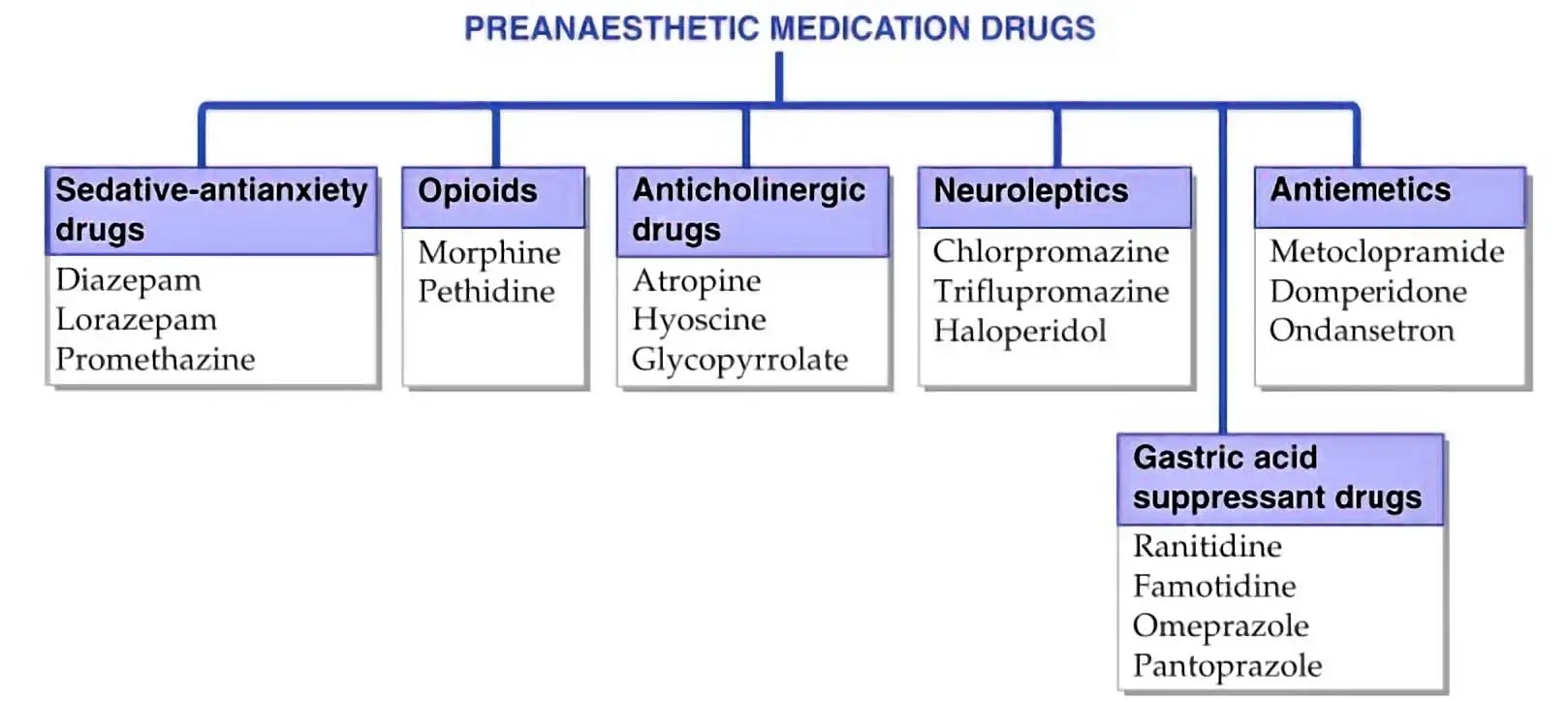When preparing for surgery or a medical procedure that requires anesthesia, the administration of pre-anesthetic medications is a common practice. These medications play a crucial role in ensuring that the patient is adequately prepared for anesthesia, reducing anxiety, and preventing various side effects.
Table of Contents
Classification
PRE-ANAESTHETIC MEDICATION DRUGS
- Sedative-antianxiety drugs- Diazepam, Lorazepam, Promethazine
- Opioids- Morphine, Pethidine
- Anticholinergic drugs- Atropine, Hyoscine, Glycopyrrolate
- Neuroleptics- Chlorpromazine, Triflupromazine, Haloperidol
- Gastric acid suppressant drugs- Ranitidine, Famotidine, Omeprazole, Pantoprazole
- Antiemetics- Metoclopramide, Domperidone, Ondansetron
Sedatives
Sedatives are used to calm and relax patients before surgery. They help reduce anxiety and promote a sense of calm. Common sedative drugs include:
- Diazepam (Valium): This medication has a tranquilizing effect and can help patients feel more at ease before surgery.
- Lorazepam (Ativan): Similar to diazepam, lorazepam is used to alleviate anxiety and promote relaxation.
Anxiolytics
Anxiolytics are drugs that specifically target anxiety. They can be particularly helpful for patients who are extremely anxious about their upcoming procedure. Common anxiolytic drugs include:
- Midazolam (Versed): This medication is often used to induce relaxation and relieve anxiety.
- Alprazolam (Xanax): Alprazolam can help reduce anxiety and nervousness.
Anticholinergics
Anticholinergic drugs help reduce the risk of excessive salivation and other secretions during surgery. They are especially useful when general anesthesia is administered. Common anticholinergic drugs include:
- Atropine: Atropine helps dry the oral and respiratory secretions, making intubation and surgery easier.
H2 Blockers
H2 blockers are used to decrease the production of stomach acid. This is important because a full stomach during surgery can lead to complications like aspiration. Common H2 blockers include:
- Ranitidine (Zantac): Ranitidine helps reduce gastric acid production.
Opioids
Opioids are sometimes used as pre-anesthetic medication to provide pain relief and reduce the amount of anesthetic needed during surgery. Common opioid drugs include:
- Morphine: Morphine can help manage pain before, during, and after surgery.
- Fentanyl: Fentanyl is a potent opioid used for pain management.
Antiemetics
Antiemetic drugs are administered to prevent nausea and vomiting, common side effects of anesthesia. Common antiemetic drugs include:
- Ondansetron (Zofran): Ondansetron is effective in preventing postoperative nausea and vomiting.
- Prochlorperazine (Compazine): This medication can help control nausea and vomiting.
Beta-Blockers
Beta-blockers may be prescribed in specific cases to manage heart conditions before surgery. Common beta-blockers include:
- Metoprolol: Metoprolol helps regulate heart rate and blood pressure.
Reference
- Classification of Progestins- KD Tripathi
- National Library of Medicine- Utilization of Pre-Anesthetic Medications for Major Surgical Procedures at a Tertiary Care Center: A Descriptive Cross-sectional Study
Related Links

I am a Registered Pharmacist under the Pharmacy Act, 1948, and the founder of PharmacyFreak.com. I hold a Bachelor of Pharmacy degree from Rungta College of Pharmaceutical Science and Research. With a strong academic foundation and practical knowledge, I am committed to providing accurate, easy-to-understand content to support pharmacy students and professionals. My aim is to make complex pharmaceutical concepts accessible and useful for real-world application.
Mail- Sachin@pharmacyfreak.com
